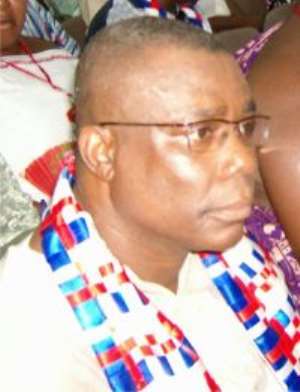
As the New Patriotic Party prepares to elect its next flagbearer and potentially Ghana's next President on December 22, information reaching The Statesman indicates that the leadership of the party are seeking ways to redefine the relationship between the party and the government in anticipation of an NPP win in December 2008.
This has become necessary following the common complaint among the party leadership across the country that there has been little or no consultation in political appointments in the past seven years.
To facilitate the redefinition, all ten Regional NPP Chairmen have crafted a 'Non-Exclusive Memorandum of Understanding' to be signed by all the 17 aspirants in the flagbearership contest, committing them to radically improve party-government relationship in the event of their being elected President.
One of the main brains behind this attempt to enhance party-government relations is Sammy Crabbe, NPP Greater Accra Regional Chairman.The document also deals with concerns of possible victimisation of failed candidates and their activists after the election.
The MoU cautions: "Should the flagbearer subsequently be elected as President he shall not target and victimise nor cause or permit any of his officers to target and victimise any member of the party, including former members of the previous NPP government, who did not support his candidacy as an aspirant or who, he and or his officers may have personal grudges against.”
The document, however, stresses that it is more an expression of intent rather than a binding contract. The idea has been welcomed by some campaign camps that this paper contacted.
The seven-point MoU states in part, “The Aspirant recognises that the NPP Constituency Parties are entering into this MoU in good faith and that their intention is not to tie his hands as President but rather to sustain a good relationship and partnership between government and the NPP throughout the Aspirant's term of office as President.”
It further stresses that the recommendations expressed in the document are all opened to negotiations.
And, in the event that the Aspirant, once he becomes President, fails to honour his part of the deal, the leaders say they “will ensure that the Aspirant is discredited in the minds of the NPP footsoldiers and activists.”
Explaining the need for the MoU, one Chairman, who spoke on condition of anonymity, said “our foot soldiers want to be stakeholders in the next NPP administration. After all, if the framers of the [NPP] constitution acknowledge that they are competent enough to elect the flagbearer, then they should be competent enough to take part in the selection of their Ministers and other officers who will run the government machinery.”
Should the aspirant be elected President, he would have committed himself to accept the recommendations of the party in the appointment of some key positions, including the Chief of Staff.
The party would also make recommendations for 40 percent of all Ministerial positions in the President's Cabinet, and 20% of all Deputy Ministerial positions.
Further, the party would make recommendations for all Regional Ministers, as well as all District and Metropolitan Chief Executives.
Also, 60% of all ambassadorial positions must have the involvement of the party.
"In the event of a reshuffle, the percentages set out … shall still be applicable and shall remain so through the President's term of office provided that in the event to such reshuffle Ministers and Deputy Ministers of State appointed pursuant to this MoU shall not be changed without the prior consent of the NPP Constituency Parties."
The terms of the MoU are not set in stone. "The above stated percentages are indicative only and therefore negotiable," it assures the aspirants.
By Nana Obeng-Danquah




 Beige-bank trial: Beige Bank disobeyed BoG — Prosecution
Beige-bank trial: Beige Bank disobeyed BoG — Prosecution
 NACOC staff arrested over cocaine smuggling
NACOC staff arrested over cocaine smuggling
 Controller and Accountant General resigns
Controller and Accountant General resigns
 Election 2024: Mute voices of politicians with 'sharp tongue' — Security Expert ...
Election 2024: Mute voices of politicians with 'sharp tongue' — Security Expert ...
 NDC opts out of Ejisu by-election
NDC opts out of Ejisu by-election
 Recommissioning of Ameri Power Plant an indication of clueless govt – NDC
Recommissioning of Ameri Power Plant an indication of clueless govt – NDC
 Love text message exposes pedophile
Love text message exposes pedophile
 Palm wine tapper kills wife over infidelity at Bogoso
Palm wine tapper kills wife over infidelity at Bogoso
 Dome Kwabenya: Mike Ocquaye washes woman panties for votes
Dome Kwabenya: Mike Ocquaye washes woman panties for votes
 MASLOC former boss sentenced to 10 years in prison with hard labour
MASLOC former boss sentenced to 10 years in prison with hard labour
